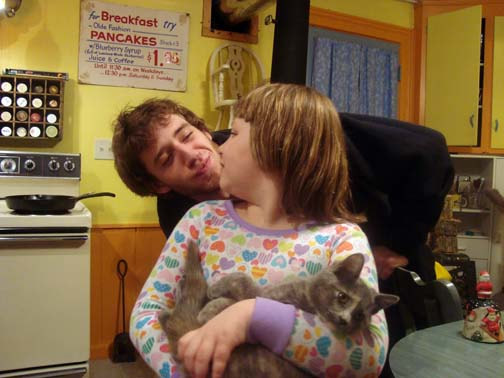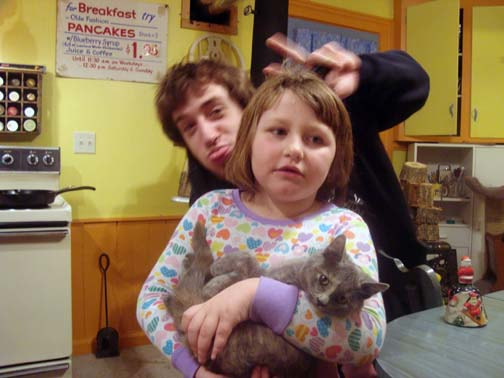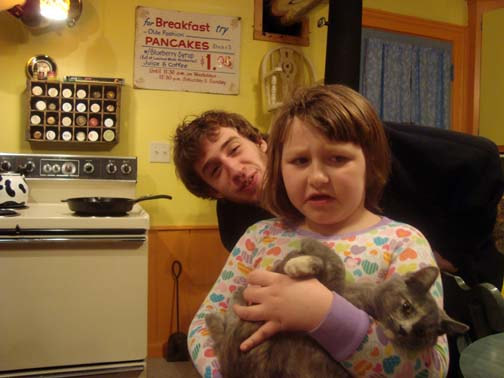|
I'm the eldest of three siblings. My brother and I are only 3 1/2 years apart, while my sister is 16 years younger than me. Unfortunately, because of our age difference, my sister and I never grew up together and didn't have much of a relationship until she became an adult. Even now, we don't share the same early experiences and had very different relationships with our parents, so our current relationship feels less like a sibling one and more of a friendship. My brother and I shared all of our early years, the joys and struggles and can reminisce together. It's a very different thing.
Although my brother and I formed an early bond, we often didn't get along. I spent my childhood feeling unloved by my mother and given preferential treatment from my dad. My brother had the opposite, being doted on by Mom and denigrated and belittled by Dad. As a result, we fought hard and often. My own children came following that same time frame with two children 3 1/2 years apart and a third much later. And, they followed the same behavior patterns. Thankfully, my two oldest get along very well now, unlike my brother and I who don't fight anymore but don't have much to do with each other either. I've realized, in watching my own children, grandchildren and siblings in my music classes, that I must have resented my brother invading my home. I imagine that when he was an infant, I adored him and envisioned myself a surrogate mom to him. I saw that with my daughter when her brother came along and again in my granddaughter when her brother was born. As these infants get older, they start resenting being smothered by their older siblings. When they can move around, they don't want to be manipulated by anyone. They want to explore their newfound freedom. They also start getting into anything that's available, including their older sibling's toys who resent that as well as being usurped as the golden child. It's a vicious circle. As parents, it's our job to protect our babies and teach the toddlers or young children respect and appropriate behavior. Of course we want them to be close and enjoy each other, but it's a delicate balance that's often hard to navigate. I've sometimes had to make rules in my music classes that the babies were to be left alone during class. I saw too many babies fussing about being poked and prodded instead of being able to enjoy the music in their own way with everyone else. The older child was so busy trying to boss the little one, they weren't engaged in the class either. Then, the parents were trying to navigate the whole situation and everyone ended up missing the joy of singing. At the risk of generalizing, I think the problem is more common with older sisters. They seem to have a maternal instinct at an early age due to their genetic make-up and also to the roles thrust upon us by society. Since the wave of radical feminism has passed, we've come around again to an age of lots of princesses, tea parties and pink tutus for girls. They see these new babies as little dollies for their pleasure. It's a short hop from that to trying to parent them, and we inadvertently reinforce that by reminding them that they are the role models. In watching all of this, I've also realized that my mother was probably just trying to protect my brother from an overzealous but loving sister. To this day, my daughter accuses me of having favored her brother over her. She has only one child. I suspect that if she'd had a second, she might understand a little better the need for parents to rein in the first child. When he was one day old, she raced to his cradle when he was crying, snatched him up and dropped him. When he got a little older, she dressed him up like a dolly, whether he wanted it or not. She bossed and pushed him around, even manipulating his little body to her own ends, and always knew better than I did what he needed or wanted. Of course, she did these things. I did them, too. As a parent though, I needed to be his protector. The mistake I made, and my mother before me, was in carrying on this protection too long. My son came to depend on it and used it to his advantage, as did my brother. It's very hard to know when the time has come to leave them to their own devices. It's hard in general to know when to cut the apron strings, but harder still when you've been thrust into the role of protector. And, make no mistake, younger siblings really do need that protection. So, how do we avoid these resentments? I think it all comes down to a familiar theme - limit setting. If we set limits early on, things shouldn't get so out of control. Yes, older siblings need to be involved and hold their younger brother or sister. But they don't need to hold them every time they ask. And, we need to be sensitive to the babies. Do they seem uncomfortable? If so, scoop them up with no apology and try again later. I've had a chance to work on this with my grandchildren and other children who visit. I often choreographed games they could play together. Sometimes, they'd have a "re-do". i.e. "____ didn't like that. How can you do that differently so that you are both happy?" or "What do you think you can do that you'll both enjoy?" Sometimes, it would just be, "______ didn't like that. Stop it!" You will all figure this out as you go. But, if you don't start early, the resentments just grow. And it's a difficult and confusing road. In spite of our differences however, my brother and I always had each other's backs. Growing up in our household was not easy. There was a lot of abuse which, I'm sure, contributed to our fighting. However, we also looked out for each other and still love each other very much. And, when our parents died, it was important for us to have each other. A sibling relationship is one of the most important ones we have. They help form who we become as adults. Siblings often have more influence than parents or teachers. We are all lucky to have them. There have been multiple studies done on sibling relationships and their importance. http://www.independent.co.uk/life-style/siblings-kind-empathetic-characteristics-children-impact-canada-study-families-a8219216.html http://www.health.com/mind-body/6-ways-your-siblings-make-you-who-you-are
0 Comments
Your comment will be posted after it is approved.
Leave a Reply. |
Archives
April 2019
Categories |




 RSS Feed
RSS Feed